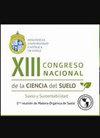NÍVEIS DE LODO DE ESGOTO NA PRODUTIVIDADE DO GIRASSOL
Revista De La Ciencia Del Suelo Y Nutricion Vegetal
Pub Date : 2007-01-01
DOI:10.4067/S0718-27912007000300002
引用次数: 63
Abstract
The aim of the present study was to evaluate the efficacy of sewage sludge in supplying N to sunflower plants in order to substitute mineral N. Sewage sludge is an organic residue and, therefore, can contribute with several nutrients like P, S, Cu, Fe, Mn and Zn in addition to N supply. Besides improving the chemical and physical characteristics of soils, utilization of sewage sludge in agriculture can increase the lifespan of sanitary landfills. The present experiment was carried out at Sao Manuel Farm, which belongs to the School of Agronomical Sciences [Faculdade de Ciencias Agronomicas‐UNESP, Botucatu] and is located at the city of Sao Manuel. An experimental design in randomized blocks was adopted including 6 treatments and 5 replications. Treatments were as follows: T0 ‐ mineral fertilization according to bulletin 100 but without N; T1 ‐ chemical fertilization according to IAC technical bulletin 100; T2 ‐ 50% of N from sewage sludge plus 50% N from chemical fertilization; T3 ‐ 100% of N from sewage sludge; T4 ‐ 150% of N from sewage sludge; T5 ‐ 200% of N from sewage sludge. Urea was used as source of N; simple superphosphate, as source of P; potassium chloride, as source of K; and boric acid, as source of B. Each parcel consisted of 100 m2. For sunflower, the utilization of sewage sludge as a source of N led to significant increases in oil and dry-weight production.污水污泥水平对向日葵产量的影响
本研究的目的是评估污水污泥为向日葵植物提供氮以替代矿物氮的功效。污水污泥是一种有机残留物,因此除了氮供应外,还可以提供几种营养物质,如P、S、Cu、Fe、Mn和Zn。除了改善土壤的化学和物理特性外,污泥在农业中的利用还可以延长卫生填埋场的使用寿命。本实验是在圣曼努埃尔农场进行的,该农场属于农学学院[博图卡图农学学院- UNESP],位于圣曼努埃尔市。采用随机分组试验设计,6个处理,5个重复。处理方法为:按公告100进行T0 -矿物施肥,但不施氮;T1‐根据IAC技术公报100进行化学施肥;T2‐50%来自污水污泥的氮加上50%来自化学肥料的氮;T3‐100%来自污水污泥的氮;T4‐150%的氮来自污水污泥;T5‐200%的N来自污水污泥。以尿素为氮源;单纯过磷酸钙,作为磷的来源;氯化钾,作为钾的来源;和硼酸作为b的来源,每包100平方米。对向日葵来说,利用污水污泥作为氮源导致其油和干重产量显著增加。
本文章由计算机程序翻译,如有差异,请以英文原文为准。
求助全文
约1分钟内获得全文
求助全文

 求助内容:
求助内容: 应助结果提醒方式:
应助结果提醒方式:


